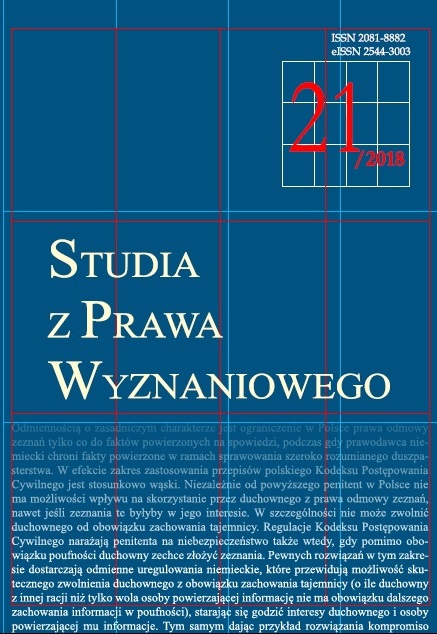Wpływ prawodawstwa okresu Polski Ludowej na przepisy prawa wyznaniowego III Rzeczypospolitej Polskiej – wybrane zagadnienia
The influence of the legislation of the Polish People’s Republic on the law on religion of the Third Republic of Poland – selected issues
Author(s): Katarzyna Krzysztofek-StrzałaSubject(s): Politics / Political Sciences, Law, Constitution, Jurisprudence, History of Law, Constitutional Law, Civil Law, Theology and Religion
Published by: Katolicki Uniwersytet Lubelski Jana Pawła II - Wydział Prawa, Prawa Kanonicznego i Administracji
Keywords: Polish People’s Republic;freedom of conscience and religion; churches;religious freedom; Church-State relations; religious organization;wolność religijna;związek wyznaniowy; Kościół katolicki; PRL
Summary/Abstract: The period of the Polish People’s Republic is known as the time when the law was an instrument in the hands of the authorities, and human and citizens’ rights were only illusory. The specificity of the law during this period resulted from its being interpreted through the Marxist-Leninist ideology commonly accepted by the political decision-makers. Although the Constitution of 1952 seemed to guarantee the freedom of conscience and religion to citizens and the freedom of fulfilling religious functions to religious communities, the interpretation of the Constitution led to completely different conclusions. However, in some parts the legislation of 1944-1989 was suitable for the incorporation into the new realities of the free Poland after 1989. This incorporation often required making adjustments and adapting it to the Third Republic of Poland ruled by law; sometimes it also required rejecting an unfair law that did not guarantee the freedom of conscience and religion ensured in the Constitution of 1997. One can also point out some provisions that were a dead letter of the law during the time of the Polish People’s Republic and were only realized in the free Poland. But the fact that not all the legal solutions from 1944-1989 were rejected is an expression of the will to maintain the continuity of the law and to single out those legal acts that after the political transformation could remain in force as acts that meet the standards of the state of law.
Journal: Studia z Prawa Wyznaniowego
- Issue Year: 2018
- Issue No: 21
- Page Range: 301-322
- Page Count: 22
- Language: Polish

